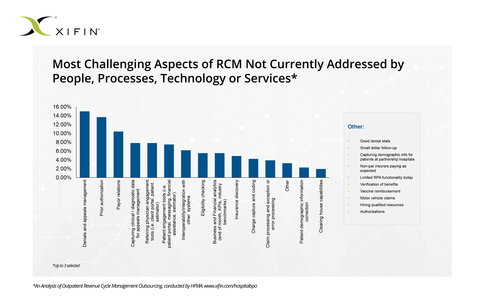XIFIN today announced the results of a first-of-its-kind study that explored health leaders’ practices, attitudes, outcomes and satisfaction levels related to outsourcing revenue cycle management for outpatient service. The study, “An Analysis of Outpatient Revenue Cycle Management Outsourcing,” was conducted by the Healthcare Financial Management Association (HFMA) and demonstrates a growing interest in and opportunity to digitally transform outpatient RCM to improve efficiencies, optimize revenue and alleviate a growing administrative burden.
This press release features multimedia. View the full release here: https://www.businesswire.com/news/home/20220629005112/en/

“XIFIN report highlights the value of outsourcing RCM to solve common RCM challenges and minimize the burden on in-house teams.” (Graphic: Business Wire)
With the COVID-19 pandemic came a greater emphasis on community outreach and an expansion of outpatient services. As outpatient revenue increases and hospitals navigate unprecedented staff shortages, RCM services that leverage multifaceted digital transformation and employ an experienced third-party team become increasingly critical to ensure that financial responsibilities are being met efficiently, effectively, and in a compliant manner.
Key findings of the report include:
- The report found that 22% of respondents that manage their inpatient RCM already outsource some of their outpatient RCM, and 12% have ambitions to employ this approach in the future.
- Organizations that outsource RCM are generally very satisfied with their outcomes, and those that are most likely to outsource one function are more likely to outsource more.
- The most challenging aspects of RCM not currently addressed by people, processes, technology or services include denials and appeals management, prior authorization and payor relations.
- The top three business drivers that guide one’s approach to outpatient RCM include patient experience, process optimization and revenue generation.
“There is pressure on hospital teams to effectively manage expanding outpatient sources of revenue and expenses,” said Bill Voegeli, Head of Custom Research, HFMA and President of Association Insights. “Many of today’s healthcare financial and RCM teams lack the necessary time, information and/or staff resources to fully understand the opportunities or implications for RCM automation beyond their electronic health record (EHR). Our research with XIFIN gives credence to the notion that healthcare finance professionals will benefit by staying up-to-date about ways to optimize the growing area of outpatient RCM and gives RCM executives insight into new avenues for optimization.”
The impact of purpose-built RCM solutions
Outpatient claims are one of the more complicated aspects of health system RCM, often wrought with errors, missing information, and inefficient processes to submit a clean claim. Hospital RCM teams have the impossible task of keeping up with growing regulatory changes and frequent fluctuations in hundreds if not thousands of payor plan-specific coverage policies, leading lower cash collections and misreported revenue adjustments.
There is a long-held belief that nearly all health systems use EHR RCM modules for their outpatient RCM. Survey respondents revealed otherwise, with approximately 25% indicating they use a purpose-built RCM solution for their outpatient or ancillary billing rather than their EHR. A purpose-built RCM solution not only increases visibility into key outpatient RCM metrics that can inform critical financial decision-making and reduce revenue shortfalls, but also expertly manages and optimizes these complex claims to minimize the burden on in-house RCM teams.
“Healthcare leaders often believe they can rely on their in-house team to manage the RCM process to improve financial performance, maintain control, or save costs. The truth is that as outpatient services grow, in-house teams should focus on high-value inpatient services rather than getting bogged down in the complexities of often lower margin outpatient services,” said Kyle Fetter, COO of XIFIN. “Outsourcing and automating most aspects of RCM can help improve a health system’s focus, profitability and cost structure. This report is evidence that those who do outsource outpatient RCM are satisfied with their results, helping increase cash collections while also minimizing inefficiencies and costs.”
The survey results are based on the responses of nearly 160 U.S.-based HFMA members, most of which are revenue cycle management leaders at large healthcare systems. Read the full report to better understand the state of outpatient RCM outsourcing in hospitals, linked here.
About XIFIN
XIFIN is a healthcare information technology company that leverages diagnostic information to improve the quality and economics of healthcare. The company’s cloud-based technology facilitates connectivity and workflow automation for accessing and sharing clinical and financial diagnostic data, linking healthcare stakeholders in the delivery and reimbursement of care across diagnostic, retail pharmacy and oncology markets. The company provides cross-specialty industry analytics including its Lab Volume Index which provides a measurement of laboratory testing volumes across the US. Its synthesis of diagnostic data enables comparisons of hospital, genetics, pathology, routine lab, COVID-19, and antibody testing across key segments. To learn more, visit www.XIFIN.com, follow XIFIN on Twitter and LinkedIn, or subscribe to the XIFIN blog.
View source version on businesswire.com: https://www.businesswire.com/news/home/20220629005112/en/